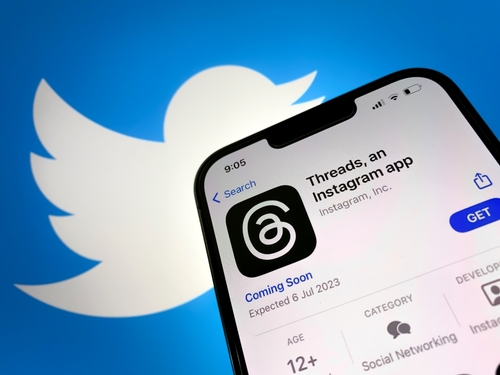Twitter threatens rival Meta with legal action over popular new app Threads

An attorney for Twitter owner Elon Musk sent Meta CEO Mark Zuckerberg a letter Wednesday accusing the company of engaging in “systematic, willful and unlawful misappropriation of Twitter’s trade secrets and other intellectual property.” Image from Shutterstock.
Twitter is threatening to sue Meta after the release and rapid popularity of its new app Threads.
Alex Spiro, an attorney for Twitter owner Elon Musk, sent Meta CEO Mark Zuckerberg a letter Wednesday accusing the company of engaging in “systematic, willful and unlawful misappropriation of Twitter’s trade secrets and other intellectual property,” CNN reports.
Spiro also alleges that Meta deliberately hired dozens of former Twitter employees, who “improperly retained Twitter documents and electronic devices,” to develop the Threads app.
The Associated Press, Reuters and Bloomberg Law also have coverage.
Twitter has been challenged by other smaller social media platforms in recent months, but CNN reports that it has not threatened them with litigation. Threads, a text-based companion to Instagram, reportedly registered 30 million users after its debut Wednesday. And, CNN reports, it was the No. 1 free app in the iOS App Store on Thursday.
Meta owns Instagram and Facebook.
Musk, presumably referring to the threatened legal action, said on Twitter on Thursday: “Competition is fine, cheating is not.”
Meta spokesperson Andy Stone also responded to the dispute Thursday, writing on Threads that “no one on the Threads engineering team is a former Twitter employee—that’s just not a thing.”
Spiro said in the letter to Meta it intends to enforce its intellectual property rights and could potentially seek civil remedies or an injunction in court.
But Carl Tobias, a professor at the University of Richmond School of Law, told CNN that the letter may not lead to litigation and could instead be used to slow Meta and the growth of Threads.
Mark Lemley, a professor at Stanford Law School, also told Reuters that Twitter may need more evidence to successfully allege that its trade secrets were misappropriated in this case.
“The mere hiring of former Twitter employees (who Twitter itself laid off or drove away) and the fact that Facebook created a somewhat similar site is unlikely to support a trade secrets claim,” Lemley said.
Hat tip to Semafor, which originally published Spiro’s letter.
Write a letter to the editor, share a story tip or update, or report an error.



